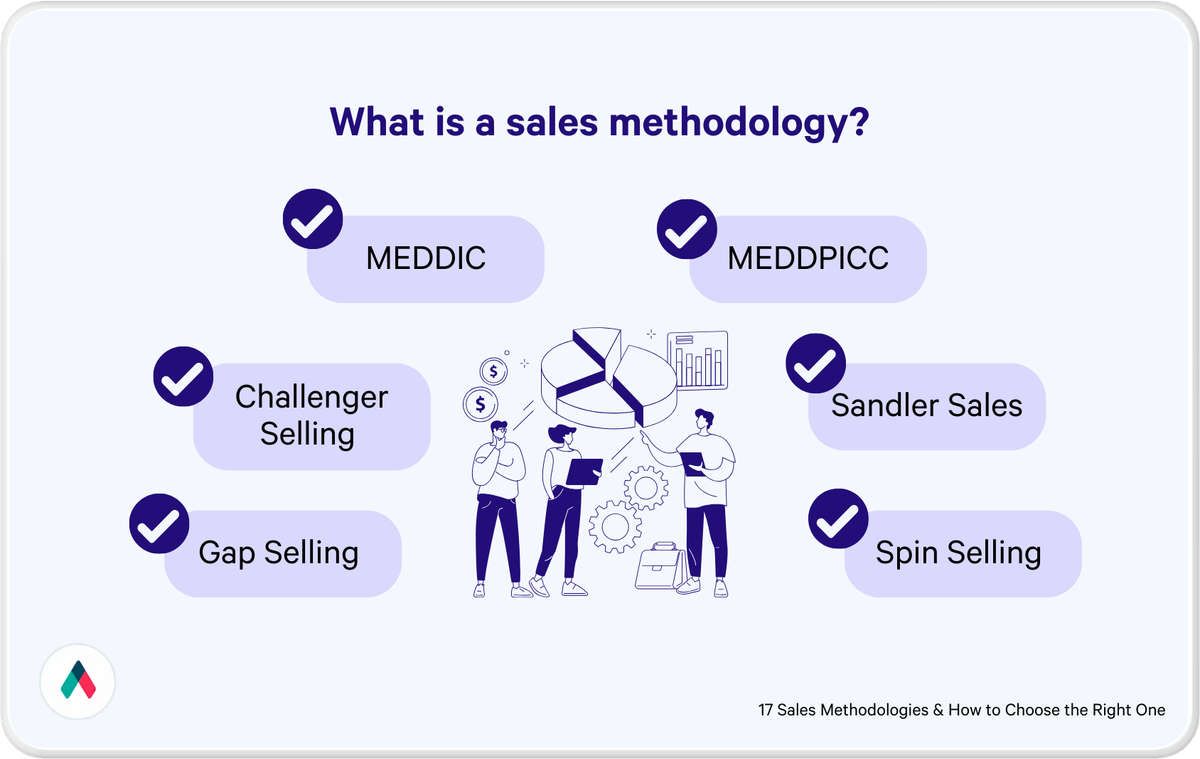If you've ever heard the phrase "anyone can be our customer," you might have rolled your eyes a little. Very few products or services, at least in the B2B space, are built for everyone. Now, if you're selling toilet paper or toothbrushes, we might have an easier time believing you, but if you're reading this article, it is more likely that you work in B2B sales and sell products or services to a specific vertical, geography, or industry (or some combination of all three).
Key takeaways
- Sales ICP (Ideal Customer Profile) is crucial for targeted and efficient prospecting in B2B sales.
- ICP and customer personas are distinct; the former targets the company level, the latter humanizes the buyer.
- Creating an ICP involves analyzing past sales data, researching profitable customers, and validating the proposed ICP with the team.
- ICP should be factored into sales strategy for successful business growth and quota attainment.
- ICP is not static; it should be consistently evaluated and refined as the company grows and scales.
What is a sales ICP?
Sales ICP stands for your ideal customer profile. This is the type of customer you're targeting. This targeting should start at the beginning of your sales process, including the research and prospecting phase. Your sales team (or even the marketing team) should be looking for businesses that fit your ideal customer profile. If you have a sales enablement team, they should be training sellers to look for opportunities that fit the ICP and providing sales and buyer enablement materials that speak directly to prospects that fit this profile.
Sales ICP Vs. customer personas
In some organizations, the terms ICP and customer personas are used interchangeably. But they shouldn't be. A sales ICP provides a detailed description of the ideal customer at the company level. Meanwhile, the customer persona adds some depth to the profile and humanizes the buyer or buying influence. It takes the concept of your ICP and brings it to life by adding some granularity and making the concept more individualized.
For example, if you're a seller for a company that makes Agency Management Software and your ICP is an agency owner with at least 75 full-time employees or at least 30 full-time employees and 45+ part-time or contract workers. Then, your customer persona might be someone like Busy Brad. He's a 45-year-old father of three who has worked his way up from Operations Director to the CEO of the agency. Busy Brad has a partner and two children who live just outside of a major city.
Busy Brad commutes into the city for work three times a week and likes to listen to sports podcasts on his way to work. He doesn't read much outside of the New York Times and some industry publications. He belongs to a well-established group of agency owners and actively participates in a mastermind. He makes somewhere between $175,000 and $200,000 per year, depending on his agency's performance. He travels a few times a year, especially in the winter when he likes to escape the cold weather.
Why is having a sales ICP important?
Defining your sales ICP and ensuring that your sales and marketing teams are aligned is important because it allows the teams to focus prospecting and messaging efforts correctly and avoids wasting time chasing prospects who aren't a good fit for your product or service.
When your teams create sales messaging (from initial outreach to sales proposals) or close deals, having the ICP in mind and focusing on their wants and needs can help ensure strong sales.
Factoring your ICP into your sales strategy is an important step in ensuring your efforts are successful. Not only will this help the business grow overall, but it will also help your sales team with quota attainment -- which can aid in attracting and retaining the best sales talent.
How to create a sales ICP
Creating your sales ICP will depend on your product or service and the duration of your business. If you have already been successfully selling, you can easily use your past sales data to determine your best ICP or ICPs if you serve multiple markets. If you're bringing a new product or service to the market, you will need to rely on market research data and a good hypothesis as to your ICP. This will need to be validated by your ICP sales strategy (how you message and sell into this market) as you launch. You may need to refine your ICP target or choose a new one until you find your stride.
1. Look at past sales data and identify your most profitable customers
If you already have some sales data (or a lot of sales data), start creating your ICP by looking to see who your most profitable customers are. You might look at your top 10-20 accounts overall. If you have a larger customer base, you might look at the most profitable customers based on specific criteria. For example, if you offer three pricing tiers and some add-ons, look at who is investing the most in your solution at each tier. This may be due to the size of the customer, the duration of the contract, or both.
2. Do some research into your most profitable customers. What do they have in common?
Now that you've identified your most profitable customers look for common attributes and make a list. When it comes to ICP development, you're looking to find as many similarities as possible. These will help you get really specific about your target audience. For example, are your best customers all around the same size? Do they share common pain points that your product or service solves, or are they in a specific profit range or geography? Understanding what makes these customers the ideal will help you create a well-defined ICP and be really specific about your target audience.
3. Validate your proposed ICP with your sales and marketing teams (and possibly your founder or leadership team)
Once you've analyzed your most profitable customers and built out your best idea for your ICP, it's time to validate it with your team. Different members of the team who have different focus areas may add to your proposed ICP. A well-defined and effective ICP requires participation from several team members to ensure it wasn't built in a silo. At this point, you're checking your blind spots to ensure your ICP covers your total addressable market.
5. Use your ICP criteria for targeting
Now is the time to put your ICP to the test and start seeing what your conversion rates look like when targeting your new or improved ICP. Start your lead generation efforts by creating messaging and distributing it to prospects closely matching your ICP. How many new leads does this generate for your business? Is the number on pace with what you have been doing, or are you starting to see an increase? The answer to this question will help you understand if you have the right ICP and sales resources to close more deals.
6. Evaluate sales performance
Creating and leveraging your ideal customer profile is not a one-and-done activity. Consistently monitoring your sales performance can help determine if your ICP is still correct or if it's time to expand or narrow in on your ICP.
As you and your team have additional sales conversations and close deals, pay attention to what is resonating with your ICP or if there are a subset of deals that fall outside of your ICP that are closing consistently. As your business grows, your ICP may evolve.
7. Revisit and refine your ICP as your company grows and scales
Being open to the possibility that your ICP will evolve is a critical part of the process. As your ICP shifts or you learn more about your ICP, keep sharing that information broadly with the rest of the sales team and your marketers, leadership team, and customer success or operations team. Finding ideal customers and keeping them satisfied is a shared responsibility.
Sales ICP examples
Understanding how to put a sales ICP together is great, but looking at a few examples of others ICPs can help you think through what should be included in your own. Here are three examples of sales ICPs that may inspire you to think more critically about your own. Even if you sell a completely different product or service than the companies in the examples below, you can learn a lot from their profiles.
CRM system
The CRM system sales team is targeting ICPs with the following characteristics:
- Hospitality industry
- Revenues north of $10M
- In business, five years or more
- A sales team of at least seven people, including a sales VP or head of sales
- Located in North America
Custom web application
The sales team for an agency responsible for building custom web applications is targeting ICPs with the following qualities:
- In the academic, AgTech or nonprofit sector
- Revenue over $25M annually
- Small web or tech teams relative to the size of the organization
- Project budgets of at least $175,000
- Timeline for implementation: 6-9 months from kickoff, minimum
Digital marketing services
The sales team for a digital marketing services consultancy is targeting the following ICPs:
- In the automotive, hospitality or B2B SaaS industries
- At least 50 employees
- Small marketing team relative to the size of the organization
- Has at least a $100,000/annual digital advertising spend
- Has a budget for at least a $5,000/month retainer
OR
- Startups in the B2B technology, cryptocurrency, or AI Space
- Under ten employees
- US or Canada Based
- Limited or no digital advertising spend
- Budget of $150,000 per year or more to invest in digital marketing services and advertising
Final Thoughts
Sales teams that use ICPs as a central part of their targeting strategy will accelerate the sales cycle and enrich the quality of customer relationships. The enhanced customer understanding derived from a meticulously crafted ICP ensures that marketing and sales initiatives are tailored to prospective clients, delivering a personalized experience that fosters stronger customer affinity. Such affinity, in turn, catalyzes customer loyalty, driving sustained revenue growth and competitive advantage.
To succeed in the increasingly complex and competitive sales landscape, adopting a data-backed and strategic approach like ICPs is no longer optional; it is an indispensable tool for better sales targeting. It empowers sales teams to prioritize resources, cultivate meaningful customer relationships, and confidently navigate a dynamic selling environment.
With a well-defined ICP guiding the way, sales teams can enhance their targeting capabilities, convert an impressive rate of prospects into satisfied customers, and drive business growth to unprecedented heights.
For sales and marketing teams that want to create impressive templates that sellers can use when communicating with their ICP, Qwilr is here to support you! Our customizable sales document templates can be used to create visually impressive and highly relevant sales documents no matter your ICP or the industry they work in. To see our tool in action, book a demo and we'll gladly show you around.
About the author

Marissa Taffer|Founder & President of M. Taffer Consulting
Marissa Taffer is the Founder & President of M. Taffer Consulting. She brings over 15 years of sales and marketing experience across various industries to a broad range of clients.
Frequently asked questions
The main difference between a sales ICP and a customer persona is that a sales ICP is about the specific type of business that a sales team should be pursuing when selling products or services and a customer persona describes the specific person at the company who would complete the deal. In some cases, buying committees are formed and multiple customer personas will participate in a deal.
Having a defined ICP is important because it helps you focus your sales efforts on the customers who are most likely to buy from you, saving time and resources.
To identify your Ideal Customer Profile, it's important to analyze your existing customer base, conduct market research, and understand the characteristics of customers who have been most successful with your product or service.
Yes! As your business grows and evolves or the market changes, your ICP may also change or expand. It is important that you revisit your ICP regularly and keep it (and the customer messaging you build around it) up to date.


